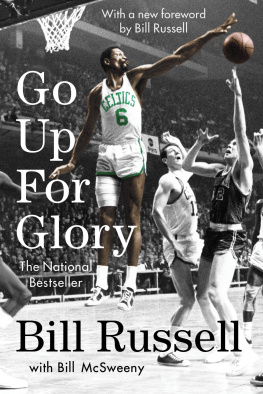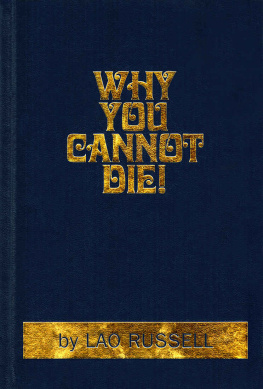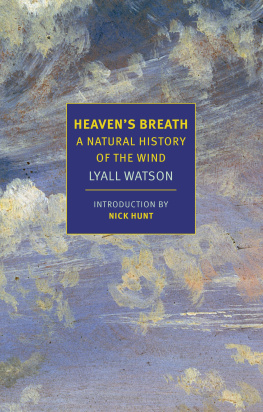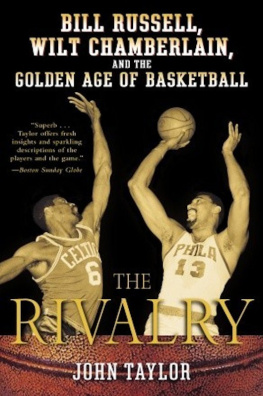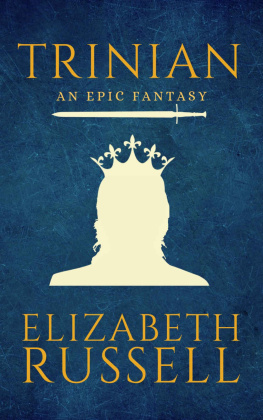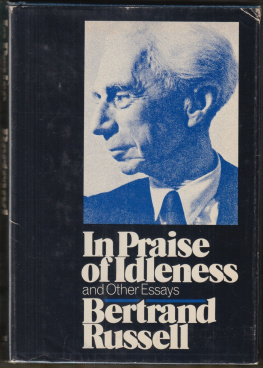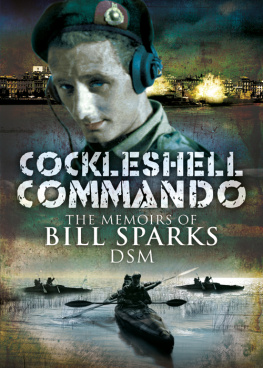Bill Russell - Second Wind: The Memoirs of an Opinionated Man
Here you can read online Bill Russell - Second Wind: The Memoirs of an Opinionated Man full text of the book (entire story) in english for free. Download pdf and epub, get meaning, cover and reviews about this ebook. publisher: Random House, genre: Non-fiction. Description of the work, (preface) as well as reviews are available. Best literature library LitArk.com created for fans of good reading and offers a wide selection of genres:
Romance novel
Science fiction
Adventure
Detective
Science
History
Home and family
Prose
Art
Politics
Computer
Non-fiction
Religion
Business
Children
Humor
Choose a favorite category and find really read worthwhile books. Enjoy immersion in the world of imagination, feel the emotions of the characters or learn something new for yourself, make an fascinating discovery.

- Book:Second Wind: The Memoirs of an Opinionated Man
- Author:
- Publisher:Random House
- Genre:
- Rating:5 / 5
- Favourites:Add to favourites
- Your mark:
- 100
- 1
- 2
- 3
- 4
- 5
Second Wind: The Memoirs of an Opinionated Man: summary, description and annotation
We offer to read an annotation, description, summary or preface (depends on what the author of the book "Second Wind: The Memoirs of an Opinionated Man" wrote himself). If you haven't found the necessary information about the book — write in the comments, we will try to find it.
Second Wind: The Memoirs of an Opinionated Man — read online for free the complete book (whole text) full work
Below is the text of the book, divided by pages. System saving the place of the last page read, allows you to conveniently read the book "Second Wind: The Memoirs of an Opinionated Man" online for free, without having to search again every time where you left off. Put a bookmark, and you can go to the page where you finished reading at any time.
Font size:
Interval:
Bookmark:
My father is a strong man. My earliest memories of him comefrom days when our whole family played together in the fieldsnear our home in Monroe, Louisiana. He worked hard in a paper-bag factory, but hed still come home full of energy and call outfor my brother and mother and me. We would follow him to fieldswhere the grass grew as tall as wheat, and the four of us wouldplay hide-and-seek there, sneaking around and tackling, laughingand rolling around in the old hiding places. When it was time togo home, my father would reach down and pick me up under onearm, my brother under the other, lean down so my mother couldcrawl up on his back, and then run all the way home, carrying hiswhole family as if we weighed nothing. | remember bouncingalong on his big forearm, laughing those long giggles the way akid does when hes happy.
Mister Charlie was in charge. He had a deep rumbling voice,and he talked in proverbs. He loved to tell stories, spin yarns andvisit his family. To all our kinfolk scattered across northern Louisi-ana, Mister Charlie was someone to count on for strength, wis-dom and good humor. He was bigsix feet two inches, over twohundred pounds and built like a heavyweight boxerso peoplewould have paid attention to him in any case, but he was also asource of warmth and laughter. People fussed if he didnt showup for a revival meeting or a family meal, and they fussed overhim when he did. Mister Charlie was like a piece of rich soil, andeverybody was looking to him to make something grow.
Not that he was perfect. Mister Charlie used to drink a littleon weekends out with the boys back in the late 1930's, and |remember one time when he came home roaring that he couldget along better by himself; he didnt need no marriage or no kids.My brother and I huddled terrified with our mother, and she toldus it was this stuff he drank that made him like that, and not topay him no mind. Which only baffled me more. All I understoodwas that something scary was happening to my father, and I feltall trembly the way I did during thunderstorms. The three of uswent over to our grandfathers for the night, and when we gotback next day everybody acted as though nothing had happened.
The very next weekend Mister Charlie came home all lit upagain, but this time he laughed and hugged us and told loud jokes.Then suddenly he got mad again and started yelling about howhe didnt need no marriage or no kids. My mother decided to staywith him, and she told us to run over to our grandfathers again.My father didnt like this, and he told my brother not to go andto make sure I didnt either. For a minute we were paralyzedbetween our parents, and then I took off, running in a panic. Mybrother was right behind me and grabbed me not far from thehouse. Panting, he told me to keep running and hed pretend hecouldnt catch me.
Our grandfather walked us back home after we fetched him.When we got there we saw our mother standing outside with aniron pipe in her hands. She was patting it lightly, and she had thebeginnings of a smile on her face and wasnt angry any more.Mister Charlie was staggering around holding his head where ourmother had whacked him. He was in pain, but not too much, andhe said, That woman sure do mean business.
The Old Man walked up to Mister Charlie and said, You'rewrong, son. You got no call to turn on the family you took andmade yourself. From then on I never saw Mister Charlie act thatway again, and he stopped boozing on weekends.My brother and I had lumps in our throats through all this. Imnot sure it was possible for me to be any more in awe of mymother than I already was, but I remember being impressed thatshe didnt seem afraid of all the power Mister Charlie had storedup inside. I couldnt understand it then, and even looking backnow, I think she was probably the only woman within a thousandmiles who was a match for him. She was always amazing us withwhat she could do. One time, we were having trouble with therats that came out of the swamp nearby to eat our chicken eggs.Mister Charlie spent a few afternoons waiting outside the hen-house to get a shot at them with us kids gathered around allexcited, and once he gave the pistol to our mother more or lessas a joke. I expected her to hand it back to him and say it wasntwomans work, but just then, by chance, a rat came scurryingacross the field toward the henhouse. Mother killed it with oneshot, smiled and handed the gun back. The rest of us, includingMister Charlie, dropped our jaws so far we could have stepped onthem. Not long after that, Mister Charlie got rid of that pistol.I think it made him nervous.
As forceful as my parents were in the town of Monroe, theywere overshadowed in strength by my grandfather, MisterCharlies father. He was stern. He had a mean streak, and the talkwas that you couldnt get very far in this world without a little bitof the Old Mans mean streak. Everybody I knew had a specialrespect for him. He was a patriarch even to people outside thefamilynot so much as a wise man or counselor but as someonewho never kowtowed to anybody. People borrowed a little dignityfrom the Old Man; he was like an oak tree.
He was the oldest living Russell that we knew of, the head ofthe line. The rest of the family had vanished when the Old Mansfather ran off to Oklahoma back in the 1880's, abandoning himas a little boy. He had grown up without a father during the hardyears in turn-of-the-century Louisiana. It had been even harderback then for a black man to survive without holding one of theselected (Negro jobsfarmhand, janitor or the like. MisterCharlies job in the bag factory was a Negro job. But the OldMan never worked for anyone. He farmed on his own until farmcredit squeezed him dry, around World War I, and after that hewas a drayman. He drove a buckboard team for hire. Every dayhe waited down at his spot near the courthouse, where peopleknew they could find him. Hed haul logs, farm equipment, furni-ture or just about anything, and when he wasnt hauling he wasbusy trading at the railroad depot. The Old Man didnt havemuch money, but he was someone you could go to if you wantedto buy or sell some chickens, and he knew how to get a little clothfrom Baton Rouge or a special kettle from St. Louis. He dealt inbasics and staples, and would clear your land or find you a wintercoat. He knew a lot of people, but he never worked for anybodyexcept as a free agent; it was a point of pride with him that nobodyhad ever been in a position to fire him. He didnt like unexpectedblows, and he believed that you could depend only on yourself.
The Old Man was lean and small compared with the laterRussells. Only his hands were large, but they were really some-thing. I remember touching them and studying them. They weresmooth and hard like leather, and they seemed too large for hiswrists. Those hands were known for what they could lift andcarry. Everybody said that pound for pound he was the strongestman they knew.
The Old Mans reputation dated back to the old days when hewas a champion logroller. Back before trucks and bulldozers cameinto use, black families in rural areas used to help each other clearland. On holidays or on Sundays, when the traveling preacherwasnt in town, all the men within ten or twenty miles would showup in the morning to clear somebodys land. There was a lot oftradition to it. Theyd cut and strip the trees, and drag all thelimbs into a big pile for burning. Nobody would burn all thattimber now, but back then it was the only way to get rid of it.So the men would spend all day setting up this huge bonfire,leaving the trunks and big logs for last, and in the afternoon thewomen and kids would arrive for a big barbecue. While they weresetting up the food, the men would have their logrolling. Twomen would go to each end of a heavy log, slide strong sticks upunder it and pick it up for carrying to the pile. There was a kindof competition about it. If you couldnt hold up your end of thestick with the man across from you, the log would roll right downon your hands and you'd have to drop it. Then somebody elsecould try to hold it up if he thought he was strong enough. It wasin these contests that the Old Man showed his strength. Theyalways put the biggest and strongest men opposite him, but henever dropped a log and never had one roll down on his hands.At least thats what I was told, and I believed it. The Old Manwas celebrated around many a bonfire.
Font size:
Interval:
Bookmark:
Similar books «Second Wind: The Memoirs of an Opinionated Man»
Look at similar books to Second Wind: The Memoirs of an Opinionated Man. We have selected literature similar in name and meaning in the hope of providing readers with more options to find new, interesting, not yet read works.
Discussion, reviews of the book Second Wind: The Memoirs of an Opinionated Man and just readers' own opinions. Leave your comments, write what you think about the work, its meaning or the main characters. Specify what exactly you liked and what you didn't like, and why you think so.

